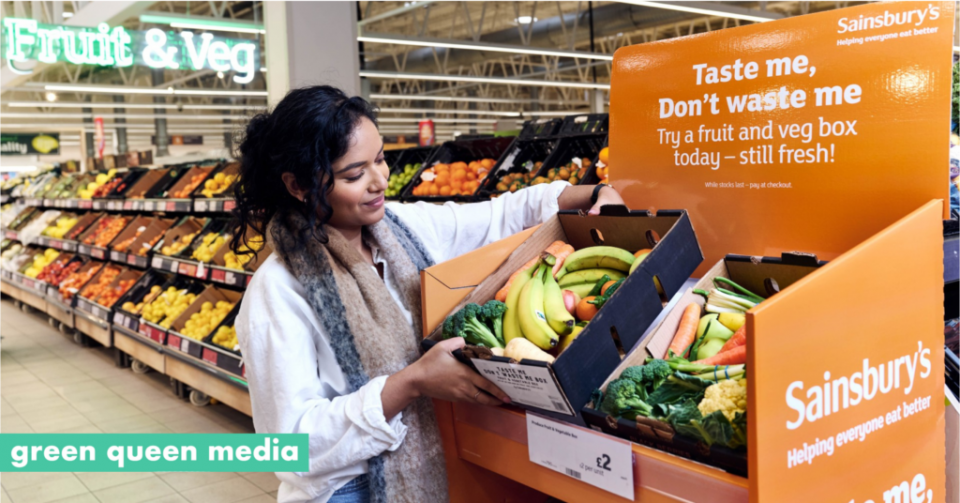Tesco, one of the United Kingdom’s largest supermarket chains, has unveiled a new initiative to tackle food waste by launching dedicated “Zero-Waste” stores. The announcement, made this week, reflects Tesco’s commitment to sustainability and responsible retailing, while responding to increasing consumer concern about environmental impact, ethical consumption, and waste reduction.
The Concept of Zero-Waste Stores
Zero-waste stores aim to minimise food waste by optimising inventory, offering products near their best-before date at discounted prices, and reducing packaging. Tesco’s pilot stores will feature:
-
Dynamic Pricing – Items approaching their expiry date are automatically discounted to encourage rapid sale.
-
Minimal Packaging Options – Bulk bins and reusable packaging options for staples such as grains, nuts, and pasta.
-
Digital Tracking – Advanced inventory management systems predict demand and optimise stock levels.
-
Donation Partnerships – Unsold but safe-to-consume items are directed to food banks and charities.
The combination of technology, smart logistics, and customer engagement creates a practical, sustainable model for reducing waste while maintaining profitability.
Why Food Waste Reduction Matters
Globally, food waste represents a major environmental, social, and economic issue. Supermarkets play a key role in managing this problem, as a significant portion of wasted food occurs at the retail level. Benefits of Tesco’s zero-waste stores include:
-
Environmental Impact – Reduced food waste lowers greenhouse gas emissions and conserves resources.
-
Economic Efficiency – Discounted products reduce losses for the retailer while offering value to customers.
-
Social Responsibility – Unsold food is redirected to charitable organisations, supporting local communities.
-
Consumer Education – Shoppers learn about waste reduction and responsible consumption.
This initiative reflects Tesco’s broader corporate responsibility goals and aligns with government and societal sustainability targets.
Consumer Benefits
For shoppers, zero-waste stores offer several advantages:
-
Cost Savings – Discounts on near-expiry items provide budget-friendly options.
-
Sustainable Choices – Opportunity to support environmentally responsible shopping practices.
-
Freshness and Quality – Optimised stock management ensures products are safe and of good quality.
-
Convenience – Clear labelling and educational signage guide informed purchasing decisions.
By addressing both price sensitivity and sustainability, Tesco appeals to a broad spectrum of consumers.
Operational and Technological Integration
Zero-waste stores rely on sophisticated inventory and pricing systems to operate efficiently:
-
AI-Driven Stock Forecasting – Predicts demand and adjusts stock orders accordingly.
-
Smart Pricing Systems – Automatically reduces prices for near-expiry products.
-
Waste Tracking Metrics – Monitors unsold products and channels donations.
-
Supply Chain Coordination – Ensures seamless integration between warehouses and stores to minimise overstock.
These technological enhancements allow Tesco to maintain a balance between sustainability, profitability, and customer satisfaction.
Marketing and Consumer Engagement
Tesco is promoting zero-waste stores through a comprehensive campaign that includes:
-
In-store signage and educational materials
-
Social media campaigns highlighting the environmental benefits
-
Recipes and tips for using near-expiry items creatively
-
Collaboration with influencers and sustainability advocates to reach wider audiences
The marketing strategy emphasises both practical and ethical dimensions, encouraging consumer participation in sustainability.
Market Context and Competition
Food waste reduction has become a strategic priority for supermarkets worldwide. Competitors such as Sainsbury’s, Waitrose, and Lidl have implemented similar initiatives, including discounted near-expiry items and donation programmes. Tesco differentiates itself through:
-
Dedicated zero-waste stores with a comprehensive approach
-
Integration of AI technology for dynamic pricing and inventory optimisation
-
Strong brand reputation and national reach
-
Emphasis on both consumer education and operational efficiency
This positions Tesco as a leader in sustainability-focused retailing within the UK market.
Challenges and Considerations
Implementing zero-waste stores requires careful planning:
-
Consumer Perception – Ensuring shoppers view discounted or near-expiry items as safe and high quality.
-
Operational Complexity – Dynamic pricing, inventory management, and donation logistics require precise coordination.
-
Staff Training – Employees must understand the system and guide customers effectively.
-
Regulatory Compliance – Ensuring all food safety standards are met in discounted and donated products.
Tesco has invested in staff training, technology, and clear communication to overcome these challenges successfully.
Future Prospects
Following the pilot phase, Tesco plans to expand the zero-waste concept to additional stores nationwide. Future enhancements may include:
-
Integration with online shopping and click-and-collect services
-
Expanded range of products eligible for zero-waste pricing
-
Partnerships with local suppliers to further reduce waste in the supply chain
-
Enhanced digital tools to track personal food waste reduction for consumers
These initiatives demonstrate Tesco’s commitment to sustainability, operational innovation, and consumer engagement.
Conclusion
Tesco’s zero-waste stores offer a forward-thinking approach to grocery retail, combining technology, sustainability, and consumer education to reduce food waste effectively. By offering discounted near-expiry items, optimising stock management, and promoting responsible consumption, Tesco strengthens its environmental and social credentials while providing tangible benefits to customers. In a competitive UK market where sustainability is increasingly important, Tesco’s initiative sets a benchmark for ethical, efficient, and consumer-focused supermarket operations.


